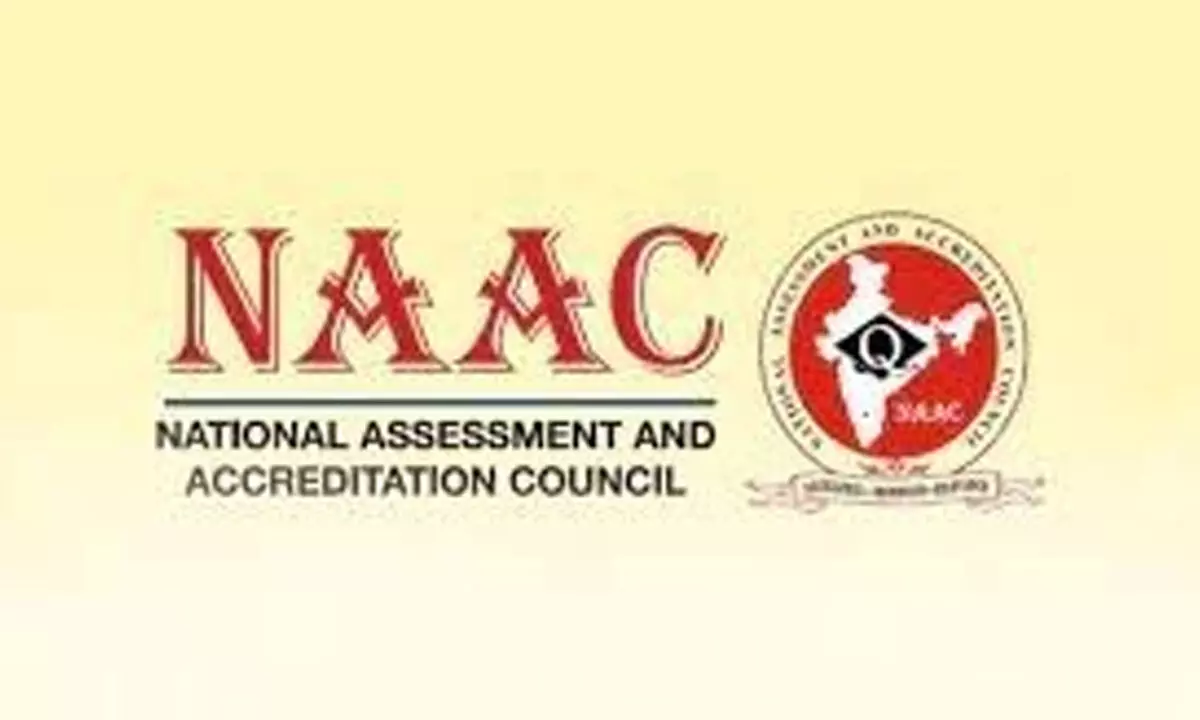Live
- Three persons admitted to hospital for diarrhea treatment
- First Star Outside Milky Way Captured: WOH G64 is 2,000 Times Larger Than the Sun
- Sikkim govt to constitute state Niti Ayog: CM Tamang
- CBI books Rajasthan narcotics inspector for Rs 3 lakh bribe
- Rajasthan bypolls: A tough contest between BJP and Congress
- Albania joins SEPA, paving way for EU integration
- Japanese government approves 250-billion USD economic package to ease price pain
- Six pharma companies to set up their units in Telangana
- The Unstable Events of a 17-Wicket Day in Perth: India vs Australia
- Dutch FM's Israel trip cancelled after Netanyahu's arrest warrant
Just In
NAAC introduces new reforms in HEI accreditation


The National Assessment and Accreditation Council (NAAC), the country’s Higher Education Institutions (HEIs) accreditated agency is all set to roll out a major initiative reforming the accreditation of the HEIs.
Hyderabad: The National Assessment and Accreditation Council (NAAC), the country’s Higher Education Institutions (HEIs) accreditated agency is all set to roll out a major initiative reforming the accreditation of the HEIs. The two-fold implementation of the reforms is meant to transport the HEIs in line with the National Education Policy 2020 to become globally competitive institutions.
The salient features of the new recommendations which were approved by the Union Education Ministry will introduce a new methodology of the accreditation process.
Accordingly, there will be a ‘Binary Accreditation’ (Either accredited or not accredited) rather than grades. The aim is to encourage all institutions to get on board in the accreditation process and create a quality culture in the higher education system. “The binary accreditation is also in line with the best practices followed by many leading countries in the world,” the NAAC said.
Secondly, the Meaturity-Based Graded Accreditation will have five levels from Level 1 to 5. This was to encourage accredited institutions to raise their bar, continuously improve, and evolve in-depth or in-breadth in disciplines from “‘Level 1’ to ‘Level 4’ as Institutions of National Excellence, and then to ‘Level-5’ i.e. Institutions of Global Excellence for Multi-Disciplinary Research and Education.” The new initiative means that the levelled accreditation shall enable Indian institutions to significantly improve their quality and position themselves among global top institutions.
Further, the metrics for both Binary and Maturity-Based Graded Accreditation shall focus on Processes, Outcomes and Impact across different attributes of HEIs (instead of mere input-centric). “The new process shall consider the heterogeneity of HEIs in the country, categorize them based on their orientation/vision and heritage/legacy, and then seek information from the HEIs that are appropriate for their category rather than a one-size-fits-all model.” That apart there will be a special focus on rural and remote location institutions through mentoring and handholding.
Third, there will be a ‘One Nation One Data Platform’ proposed as part of the reform to ensure integrity and transparency in handling institutional data. The new platform shall capture a superset of data from HEIs for varied purposes like approval, accreditation, ranking etc, with an in-built design for collateral cross-checking to check the authenticity of data.
In addition, to improve the validity and reliability of the data “Stakeholder validation” has been proposed to effectively integrate stakeholders as part of the accreditation and ranking process.
The new system will be based on the model of ‘trust and data driven’ and with minimal visits to an institution for verification. However, it will carry heavy penalties when an institution is found making wrong submissions. In addition, there will be provision for customized ranking based on stakeholders such as industry, funding agencies, students etc.
Against the backdrop, the NAAC’s Executive Committee on Saturday has decided to implement the said reforms in two stages.
In the first stage, the Binary accreditation will be implemented in the next four months and no new applications will be accepted as per the present methodology thereafter. Institutions that have already applied and are applying in the next four months shall have the option to either go by the present process or by the new methodology of binary accreditation.
The Maturity-based Graded levels will be implemented by December 2024. The methodologies and formats are being redesigned based on recommendations of Dr. Radhakrishnan’s committee report and the same shall also be reflected in the data collection and validation process using One Nation One Data Platform making the system friendly, easy and smooth. The new reforms are expected to be implemented before the end of 2024.

© 2024 Hyderabad Media House Limited/The Hans India. All rights reserved. Powered by hocalwire.com






